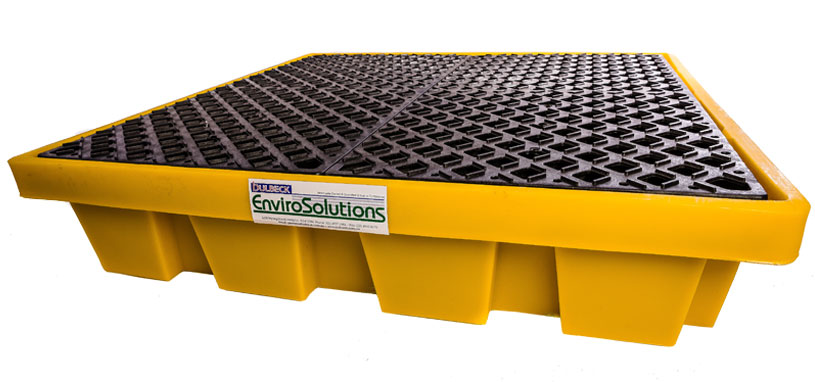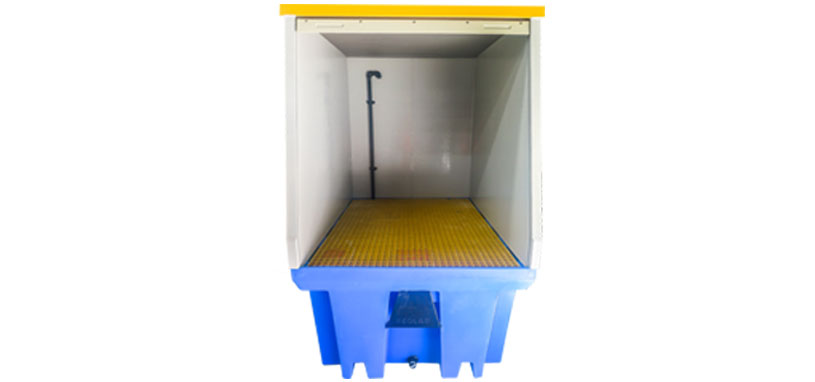The importance of IBC pallets for the environment
Intermediate Bulk Containers (IBCs) are used all over the world and in diverse industries to store and transport chemical products. They are particularly useful in remote locations for construction and mining companies who need bulk supplies of chemicals on site for their activities.
But IBCs can be punctured leaking their hazardous contents into the ground. This is exactly what happened during a construction project on an island off the coast of Western Australia. To make matters worse, the island is classified as a Class A Nature Reserve. When moving an IBC, a deformity in the base plate caught on the forklift tynes, tearing a hole in the IBC.
IBC spill pallets are designed to capture and contain a spill from an IBC so that the hazardous materials are kept away from the environment.
What is an IBC spill pallet?
A standard size for IBCs is 1,000 litres. An IBC spill pallet is designed to capture 110 per cent of this full volume of liquid to ensure that no spillage reaches the environment. An IBC spill pallet is therefore a special kind of pallet which has an internal storage space of at least 1,100 litres. These pallets are made from a heavy-duty polyethylene base, which is resistant to chemicals and hydrocarbons. IBCs are placed on the fibreglass grate for storage or transport.
SpillPro supplies different types of IBC spill pallets. Single or double units can be used indoors or undercover. Hardcover units can be used outdoors in the open air. PVC softcovers can also be provided for weather protection.

Where can IBC spill pallets be used?
IBC spill pallets can (and should) be used wherever you find IBCs. The higher volume of IBCs compared to drums makes them popular among chemical and hydrocarbon users. Another advantage is the square shape and tyne holes which makes it easy to manoeuvre them with a forklift.
Typical industries that use IBC spill pallets include:
-
Warehousing and storage facilities – indoor or outdoor
Remote locations like construction and mining sites can benefit from the use of IBCs. They require multiple products like fuel, oil and chemicals - all of which can be provided in IBCs. Logistics are easier through the common container size and their compatibility with forklift equipment. IBC spill pallets therefore provide essential protection to the environment in these remote locations.
How do you clean an IBC spill pallet?
If a spill occurs into a spill pallet, it must be disposed of in an environmentally sustainable way. In most cases, the product can be reused. Once the main spill has been removed, the pallet must still be cleaned. This can easily be accomplished using water and a detergent. Waste water from the cleaning of spill pallets cannot be discharged directly to the storm water. It must be captured and treated along with other effluent water from the site.
What is the advantage to using IBC spill pallets?

Companies use IBC spill pallets to contain spills and protect the environment. The best form of cure for spills is to prevent them from happening in the first place. IBC pallets are the first line of defence. Capturing a spill makes sure that there is no negative impact on the environment and eliminates the cost of expensive clean ups.
Cleaning up a spill is not the only expensive task associated with environmental incidents. Regulators like the EPA monitor the performance of companies and impose substantial fines for companies that do not comply with environmental legislation.
IBC spill pallets help companies to meet their obligations for due diligence. Using these products demonstrates a reasonable consideration of the risks associated with IBCs and an appropriate response to mitigate failures.
Contact SpillPro for more information about IBC spill pallets
SpillPro supplies a range of IBC spill pallets designed to protect your company from the damaging consequences of a chemical spill. Find out more about IBC spill pallets here, or call our expert team on 1800 368 450 today.
Must Read
SpillPro on 24 February 2025
Why Spill Readiness Matters
A spill isn't just an inconvenience. If not handled properly, it can lead to safety hazards, environmental damage, and compliance issues. By equipping your site with the right spill response solutions ...
Read moreSpillPro on 30 October 2024
Choosing the Right Containment Boom
Containment booms are the first line of defence in any spill response plan. When a spill occurs, swift and effective containment is crucial to minimise environmental impact and financial loss. Selecti ...
Read more